“Unlock the secrets of Moringa Mastery with our expert tips on utilizing Morning Powder to its fullest potential. Perfect for those looking to integrate the health-boosting benefits of Moringa into their daily routine, our guide offers practical advice for incorporating this nutrient-dense superfood into meals, smoothies, and more. Discover how Morning Powder can elevate your health and wellness strategy today.”
Introduction to Moringa
Moringa Oleifera, commonly known as Moringa, is a plant native to the Himalayan foothills. This “miracle tree” has been used for centuries in traditional medicine and cooking. In recent years, it has gained popularity as a superfood, especially in its powdered form.
Table of Contents
The Nutritional Profile of Moringa Powder
The nutritional profile of Moringa powder is what truly sets it apart as a superfood. Derived from the dried leaves of the Moringa oleifera tree, this powder is an incredibly dense source of vitamins, minerals, and other beneficial compounds. Here’s a closer look at its nutritional composition:
- Vitamins: Moringa powder is exceptionally rich in vitamins, particularly vitamin A (from beta-carotene), vitamin C, and vitamin E. These vitamins are crucial for maintaining good vision, immune function, skin health, and antioxidant protection.
- Minerals: It contains an abundance of essential minerals including calcium, potassium, and iron. Calcium is vital for bone health, potassium for heart and muscle function, and iron is crucial for red blood cell formation.
- Protein: Moringa powder is a rare plant-based source of all nine essential amino acids, making it a complete protein. This is particularly beneficial for vegetarians and vegans who might struggle to get complete proteins from plant sources.
- Antioxidants: The powder is loaded with antioxidants like quercetin and chlorogenic acid. Antioxidants are compounds that fight free radicals in your body, reducing oxidative stress and lowering the risk of chronic diseases.
- Fiber: It also contains a significant amount of dietary fiber, which is beneficial for digestive health. Fiber aids in digestion, helps in maintaining a healthy gut, and can contribute to weight loss efforts.
- Anti-Inflammatory Compounds: The isothiocyanates found in Moringa are known for their anti-inflammatory properties, which can help reduce inflammation in the body, potentially lowering the risk of various chronic conditions like heart disease and diabetes.
- Other Plant Compounds: Moringa leaves are also rich in other beneficial plant compounds, including polyphenols, which have been studied for their potential to improve blood sugar control and overall health.
This remarkable nutritional profile makes Moringa powder an excellent supplement for people seeking to boost their nutrient intake. Its high vitamin and mineral content can support overall health, while its antioxidants and anti-inflammatory compounds provide additional health benefits. Whether added to smoothies, juices, or sprinkled over meals, Moringa powder offers a simple way to increase the nutritional value of your diet.
Health Benefits of Moringa Powder
Moringa powder, derived from the leaves of the Moringa oleifera tree, is celebrated for its impressive range of health benefits. This nutrient-rich superfood has been linked to a variety of positive health outcomes:
- Boosts Immune System: High in vitamins A and C, Moringa powder strengthens the immune system, helping the body ward off infections and illnesses.
- Supports Weight Loss: Its high fiber content aids in digestion and can promote a feeling of fullness, which helps in managing appetite and supporting weight loss efforts.
- Enhances Skin Health: The antioxidants and vitamins E and A in Moringa powder protect the skin against free radicals, reducing signs of aging and improving skin health and appearance.
- Anti-inflammatory Effects: Moringa contains isothiocyanates, known for their anti-inflammatory properties, which can help reduce inflammation in the body, thus aiding in the management of conditions like arthritis.
- Improves Digestive Health: The fiber in Moringa powder aids in digestion and can improve gut health, helping to prevent issues like constipation and promoting a healthy digestive system.
- Regulates Blood Sugar Levels: Some studies suggest that Moringa may help in regulating blood sugar levels, which is beneficial for people with diabetes or those at risk of developing the condition.
- Lowers Cholesterol: Moringa has been found to lower cholesterol levels, which can reduce the risk of heart disease.
- Enhances Energy Levels: Due to its rich nutrient profile, including a high iron content, Moringa powder can help in boosting energy levels, making it a great addition to the diet of those dealing with fatigue.
- Improves Brain Health: Its high content of antioxidants and neuroprotective properties may contribute to better brain health and cognitive function, potentially even lowering the risk of neurodegenerative diseases.
- Supports Bone Health: With a significant amount of calcium and phosphorus, Moringa powder helps in maintaining strong and healthy bones.
- Detoxification: Moringa has detoxifying properties, helping in cleansing the body and flushing out toxins.
- Rich in Antioxidants: The antioxidants in Moringa, such as quercetin and chlorogenic acid, combat oxidative stress and may lower the risk of chronic diseases like heart disease and diabetes.
- Mood Enhancement: Moringa’s high magnesium content can improve mood and reduce stress and anxiety, contributing to overall mental well-being.
These health benefits make Moringa powder a highly valued dietary supplement. Its inclusion in daily nutrition can contribute significantly to overall health and wellness, particularly in modern diets that may lack sufficient nutrients.
Culinary Uses of Moringa Powder
Moringa powder, with its mild, earthy flavor, offers a versatile and nutritious addition to many culinary creations. Its uses in the kitchen are diverse, allowing it to be incorporated into both sweet and savory dishes. Here are some ways to use Moringa powder in cooking and baking:
- Smoothies and Juices: A teaspoon of Moringa powder can be blended into smoothies or juices, adding a nutrient boost without significantly altering the taste.
- Teas and Beverages: You can stir Moringa powder into hot water to make a herbal tea, or add it to lattes and other warm beverages.
- Soups and Stews: Moringa powder can be added to soups and stews, where it contributes nutrients without overpowering the other flavors.
- Baked Goods: Incorporate Moringa powder into bread, muffins, or pancakes for a nutritious twist. It pairs well with other wholesome ingredients like whole grains, nuts, and fruits.
- Salad Dressings: Mix Moringa powder into vinaigrettes or creamy salad dressings to drizzle over fresh salads.
- Yogurt and Breakfast Bowls: Sprinkle Moringa powder over yogurt, oatmeal, or cereal to start the day with an extra boost of nutrients.
- Sauces and Dips: You can blend Moringa powder into sauces, pestos, or dips like hummus for added flavor and nutrition.
- Seasoning Blends: Mix Moringa powder with other herbs and spices to create a unique seasoning blend for meats, tofu, or vegetables.
- Energy Bars and Snacks: For a healthy snack, add Moringa powder to homemade energy bars or balls, along with ingredients like nuts, seeds, and dried fruit.
- Desserts: Experiment by adding a small amount of Moringa powder to desserts like puddings, ice creams, or fruit salads.
Because Moringa powder has a relatively mild taste, it can be easily added to a variety of dishes without significantly changing their flavor. This makes it an easy and effective way to enhance the nutritional value of everyday meals and snacks. Remember, a little goes a long way, so start with a small amount and adjust to your taste preferences.
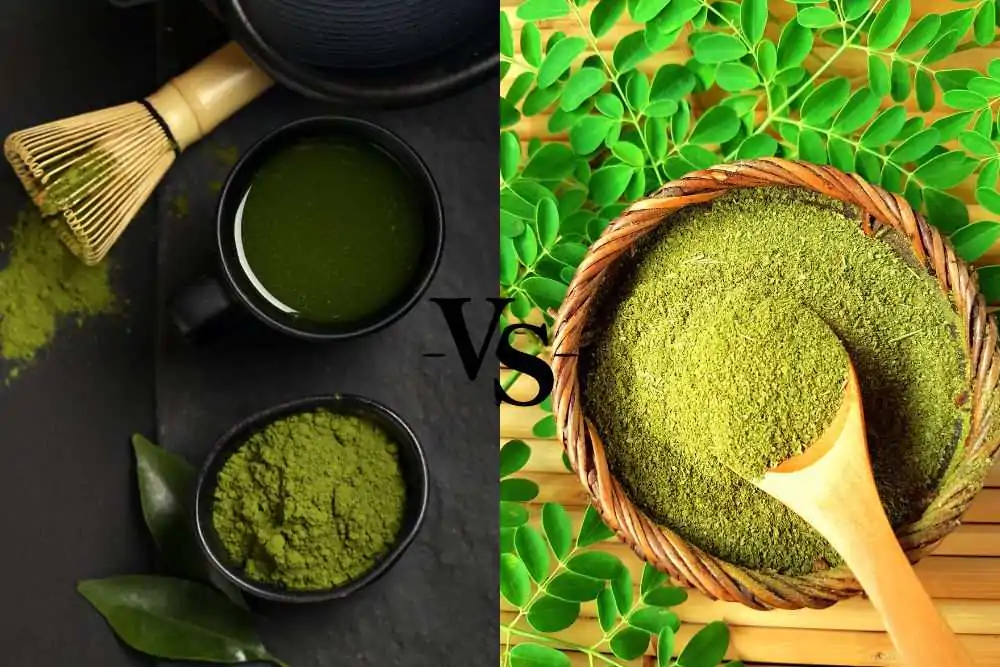
Moringa in Traditional Medicine
Moringa oleifera, commonly known as Moringa, has a long-standing history in traditional medicine, particularly in regions where it is natively grown such as India, Africa, and Southeast Asia. Here’s an overview of its role in traditional medicinal practices:
- Ayurvedic Medicine: In Ayurveda, an ancient Indian system of medicine, Moringa has been used for thousands of years. It is known as “Shigru” in Sanskrit and is reputed for balancing the “doshas” (the body’s fundamental bio-elements). Moringa is used to treat a wide range of conditions, from digestive disorders to inflammation, and is also valued for its detoxifying properties.
- African Traditional Medicine: In many African cultures, Moringa is used as a remedy for malnutrition, especially in children and nursing mothers. Its leaves, rich in protein, vitamins, and minerals, are used to boost the immune system and improve overall health.
- Siddha Medicine: In Siddha medicine, another traditional system from South India, Moringa is used for its anti-inflammatory and analgesic properties. It is commonly prescribed for treating pain, fever, and inflammatory conditions.
- Unani Medicine: In Unani, a form of traditional medicine practiced in the Mideast and South Asian countries, Moringa is used for its purported benefits in improving liver function, preventing stone formation, and treating stomach ulcers.
- Other Traditional Uses: Moringa leaves, bark, flowers, fruit, seeds, and root are used in various traditional remedies across the world. For instance, its seeds are used for purifying water, its leaves are applied to wounds to reduce infection, and its root is used for its spicy flavor and medicinal properties similar to those of horseradish.
Moringa’s use in traditional medicine is backed by modern scientific research to some extent, particularly its anti-inflammatory, antioxidant, and nutritional properties. However, it’s important to note that while traditional practices provide valuable insights into the potential uses of Moringa, they should be complemented with contemporary scientific understanding, especially regarding dosages and potential interactions with other medications.
Growing and Harvesting Moringa
Growing and harvesting Moringa, known for its nutritional and medicinal properties, can be a rewarding endeavor. Here are the key steps and considerations for cultivating and harvesting Moringa:
Growing Moringa
- Climate and Soil: Moringa thrives in warm, tropical, or subtropical climates. It prefers well-drained sandy or loamy soil, but it is remarkably tolerant of poor soil conditions.
- Planting: Moringa can be grown from seeds or cuttings. The seeds can be directly sown in the soil or started in pots. For cuttings, use a mature branch and plant it in moist soil.
- Watering: While Moringa is drought-resistant, regular watering helps in the initial growth phase. Once established, it requires minimal water.
- Sunlight: Moringa plants need full sunlight to grow robustly. Ensure they are planted in an area that receives plenty of direct sunlight.
- Fertilizing: Generally, Moringa plants do not require much fertilization. If needed, use organic compost to enhance growth.
- Spacing: If planting multiple Moringa trees, space them at least 3 meters apart to give ample room for growth.
Harvesting Moringa
- Leaves: The leaves can be harvested once the plant reaches about 1.5 meters in height. Pluck the leaves from the stems, and if needed, the entire branches can be cut for a more significant harvest.
- Pods: Moringa pods are best harvested when they are still green and tender. They can be picked off the tree by hand.
- Seeds: If you are harvesting seeds, wait until the pods have dried and turned brown on the tree. Then, remove the seeds from the pods.
- Drying and Storing: Leaves can be dried in a shaded, well-ventilated area and then stored in an airtight container. Pods can be used fresh, or seeds can be extracted and stored.
Tips for Growing Moringa
- Pruning: Regular pruning encourages branching and increases leaf production. Prune the top of the tree to keep it at a manageable height for harvesting.
- Pest and Disease Management: Moringa is not significantly troubled by pests or diseases. However, keeping an eye out for common garden pests and addressing them promptly is advisable.
- Seasonal Considerations: In cooler climates, Moringa should be grown in pots and moved indoors during colder months as it cannot tolerate frost.
Growing Moringa is relatively straightforward, making it accessible for gardeners of various skill levels. Whether for personal use or as a part of a larger agricultural project, Moringa provides both nutritional benefits and environmental advantages, such as improving soil quality and providing a habitat for beneficial insects.
Purchasing and Storing Moringa Powder
Purchasing and storing Moringa powder correctly is crucial for maintaining its nutritional value and freshness. Here are some tips and considerations for buying and storing Moringa powder:
Purchasing Moringa Powder
- Quality and Purity: Look for high-quality, organic Moringa powder to ensure it’s free from pesticides and contaminants. The color should be a vibrant green, which indicates freshness.
- Source: Preferably choose Moringa powder sourced from regions known for their quality produce, like India or Africa. Check the label for information about the origin.
- Processing Method: Ensure the powder is made from dried leaves only and has no added fillers or preservatives. The best quality Moringa powder is often slow-dried, which preserves its nutrients better.
- Packaging: Opt for powder that comes in airtight, sealed packaging to protect it from moisture and air.
- Certifications: Look for certifications like USDA Organic, Non-GMO, or Fair Trade, which add an extra layer of trust regarding the product’s quality and ethical sourcing.
Storing Moringa Powder
- Airtight Container: Once opened, transfer the Moringa powder to an airtight container to keep it fresh and protect it from moisture.
- Cool, Dark Place: Store the container in a cool, dark place like a pantry or cupboard, away from direct sunlight and heat, which can degrade its quality.
- Avoid Moisture: Keep the powder dry. Moisture can lead to spoilage and the growth of mold or bacteria.
- Refrigeration: While not always necessary, refrigerating the powder can extend its shelf life, especially in warmer climates.
- Use Clean Utensils: When using the powder, always use clean, dry utensils to avoid introducing moisture or contaminants.
- Shelf Life: Properly stored Moringa powder can last up to two years. However, for optimum nutrient retention, it’s best to consume it within six months to one year.
By carefully selecting and properly storing Moringa powder, you can enjoy its full range of health benefits. Always check for signs of spoilage like changes in color, smell, or the presence of mold before using, and replace the powder if it appears compromised.

Potential Side Effects and Precautions
While Moringa is celebrated for its health benefits, it’s important to be aware of potential side effects and precautions:
- Blood Sugar Levels: Moringa has been shown to lower blood sugar levels. While beneficial for many, it could potentially cause hypoglycemia in people with diabetes who are on blood sugar-lowering medication.
- Blood Pressure: Moringa may lower blood pressure, which is generally positive, but it could cause issues for people on blood pressure medication, leading to hypotension.
- Pregnancy and Breastfeeding: There’s limited research on the safety of Moringa during pregnancy and breastfeeding. The roots, bark, and flowers might contain harmful substances, so it’s safer to avoid those parts and consult a healthcare provider before consuming Moringa in these situations.
- Allergic Reactions: As with any plant-based product, there’s a potential for allergic reactions. People who are sensitive to plants like ragweed should use Moringa cautiously.
- Interaction with Medications: Moringa may interact with certain medications, including those for thyroid issues, so it’s advisable to consult a healthcare professional before adding Moringa to your regimen if you are on medication.
- Digestive Issues: Consuming large amounts of Moringa powder may lead to digestive issues like diarrhea or stomach upset, particularly for those not used to high-fiber diets.
- Nutrient Imbalance: Due to its high vitamin and mineral content, excessive consumption of Moringa could potentially lead to an imbalance in nutrients. It’s important to consume it in moderation as part of a balanced diet.
- Heavy Metal Contamination: Some Moringa products may be contaminated with heavy metals if grown in polluted areas. Always opt for Moringa from a reputable source with good quality control practices.
- Overconsumption: As with any supplement, more is not always better. Stick to recommended dosages to avoid any adverse effects.
In summary, while Moringa offers numerous health benefits, moderation and awareness of individual health circumstances are key. Consulting with a healthcare provider is recommended, especially for those with pre-existing health conditions or those taking medication.
Comparing Moringa with Other Superfoods
Moringa, often touted as a superfood, stands out for its impressive nutritional profile. However, it’s interesting to compare it with other well-known superfoods to understand their unique benefits:
Moringa vs. Spirulina
- Nutritional Content: Both Moringa and Spirulina are rich in nutrients. While Moringa is high in vitamins A and C, calcium, and iron, Spirulina is a microalgae known for its high protein content and essential fatty acids.
- Antioxidant Properties: Moringa is rich in antioxidants like quercetin and chlorogenic acid. Spirulina contains phycocyanin, a potent antioxidant.
- Detoxifying Properties: Spirulina is often praised for its detoxifying properties, especially heavy metal chelation. Moringa also aids in detoxification but is more noted for its high nutrient content.
- Ease of Cultivation: Moringa is easier to cultivate and requires less water than Spirulina, which needs specific conditions for algae growth.
Moringa vs. Turmeric
- Active Compounds: Moringa is packed with various vitamins, minerals, and polyphenols. Turmeric is known for curcumin, a compound with strong anti-inflammatory and antioxidant effects.
- Usage in Traditional Medicine: Both have been used in traditional medicine. Moringa is a staple in Ayurvedic medicine for overall health, while turmeric is primarily used for its anti-inflammatory and healing properties.
- Flavor Profile: Moringa has a mild, earthy flavor, making it versatile in culinary uses. Turmeric has a distinct warm, bitter flavor and is a common ingredient in curries and other dishes.
Moringa vs. Chia Seeds
- Omega-3 Fatty Acids: Chia seeds are an excellent source of omega-3 fatty acids, which are beneficial for heart health. Moringa, while nutritious, doesn’t contain omega-3s.
- Fiber Content: Both are high in dietary fiber, but chia seeds particularly stand out in this regard, known for their ability to absorb water and expand, aiding in digestion.
- Protein Quality: Moringa is a rare plant-based complete protein source, containing all nine essential amino acids, which is less common in plant foods compared to chia seeds.
Moringa vs. Quinoa
- Protein Quality: Like Moringa, quinoa is a complete protein source, making both excellent choices for vegetarians and vegans.
- Carbohydrate Content: Quinoa is a good source of complex carbohydrates and is higher in calories than Moringa, making it a great energy source.
- Versatility in Cooking: Quinoa is primarily used as a grain in cooking, while Moringa powder is more versatile in its uses, from smoothies to baking.
In summary, while Moringa holds its own as a nutrient-rich superfood, each superfood like Spirulina, Turmeric, Chia Seeds, and Quinoa has unique benefits and uses. The choice depends on individual dietary needs, preferences, and health goals. Combining these superfoods in a balanced diet can provide a wide range of nutrients beneficial for overall health.
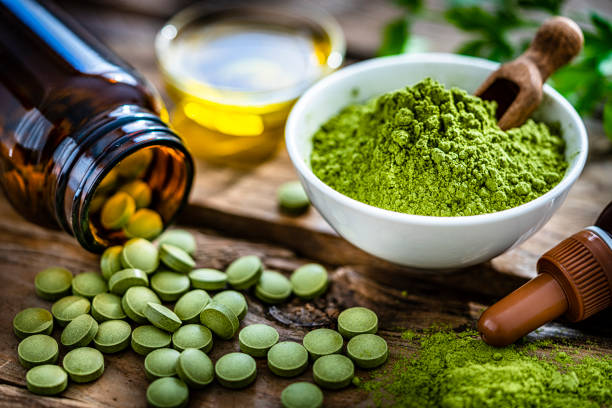
Moringa for Fitness Enthusiasts
Moringa is increasingly popular among fitness enthusiasts due to its nutrient-dense profile and health benefits that are particularly advantageous for those with an active lifestyle:
- Rich in Protein: Moringa is a good source of plant-based protein, essential for muscle repair and growth. Its complete amino acid profile makes it especially valuable for vegetarians and vegans who may struggle to find complete sources of protein in their diet.
- Anti-inflammatory Properties: The anti-inflammatory compounds in Moringa, like isothiocyanates, can help reduce muscle soreness and inflammation, making it beneficial for recovery post-exercise.
- Energy Boost: Moringa’s high iron content can help in improving energy levels and combating fatigue. Iron is crucial for the production of hemoglobin, which transports oxygen to the muscles, vital for stamina and endurance.
- Supports Metabolism: Moringa can enhance the body’s metabolic rate due to its combination of B vitamins, especially B6, which aid in metabolism and energy production.
- Weight Management: Its high fiber content and low calorie count make Moringa an excellent supplement for weight management. The fiber promotes a feeling of fullness, reducing the likelihood of overeating.
- Enhances Immune Function: Regular workouts can sometimes put a strain on the immune system. The high vitamin C content in Moringa helps strengthen immunity, keeping fitness enthusiasts healthy and active.
- Rich in Antioxidants: The antioxidants in Moringa, such as vitamin C, vitamin E, and flavonoids, combat oxidative stress generated during intense workouts, aiding in the recovery and health of muscle tissues.
- Bone Health: Moringa’s high calcium and magnesium content support bone health, which is crucial for fitness enthusiasts who engage in weight-bearing and high-impact exercises.
- Hydration: Moringa leaf powder can be added to water or sports drinks for an extra nutrient boost, helping in maintaining hydration levels during intense physical activities.
- Improves Focus and Mental Clarity: Regular exercise requires mental stamina and focus. Moringa’s brain health benefits can aid in maintaining mental sharpness and focus during workouts.
Incorporating Moringa into a fitness routine can be as simple as adding the powder to smoothies, protein shakes, or even just mixing it with water. It’s a natural and effective way to support and enhance physical performance, recovery, and overall health, making it a valuable addition to the diet of anyone who is physically active.
Source to Get Organic Moringa Leaf Powder Capsules
Conclusion
Moringa powder is a multifaceted superfood with a range of benefits for health, beauty, and even sustainable agriculture. Its versatility in use and the numerous health benefits it offers make it a valuable addition to anyone’s diet.
FAQs
- Is Moringa powder safe for everyone? While Moringa is generally safe, individuals with specific health conditions or those who are pregnant should consult a healthcare provider before use.
- How does Moringa powder taste? Moringa powder has a mild, earthy taste that can be easily incorporated into various dishes without overpowering the flavor.
- Can Moringa powder be used externally? Yes, Moringa powder can be used in homemade skin and hair care products for its nourishing properties.
- How much Moringa powder should I use daily? A typical dosage is one to two teaspoons per day, but it’s best to start with a smaller amount and gradually increase.
- Does Moringa interact with medications? Moringa may interact with certain medications. It’s important to consult a healthcare provider if you are on medication.

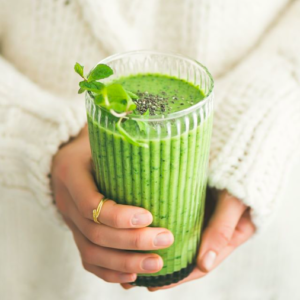







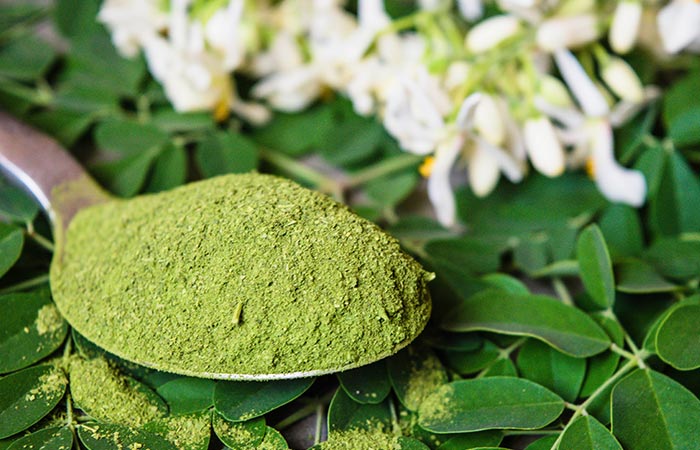
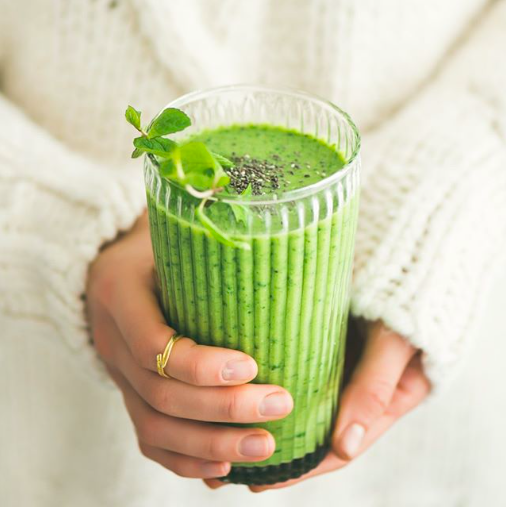
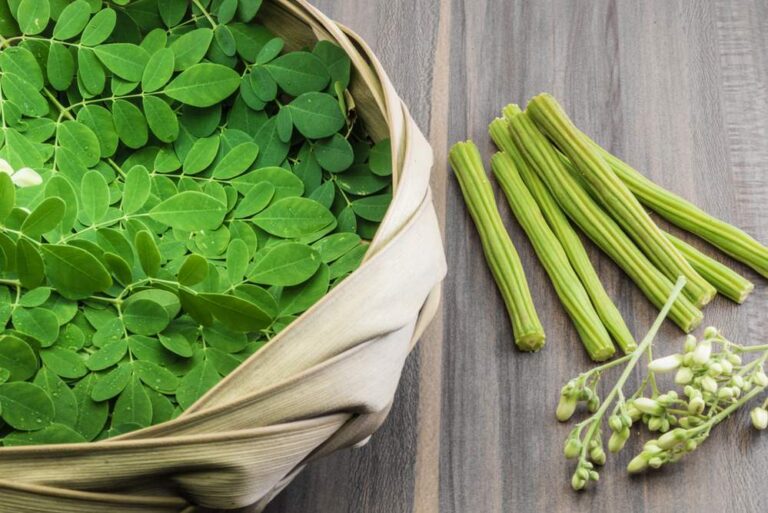
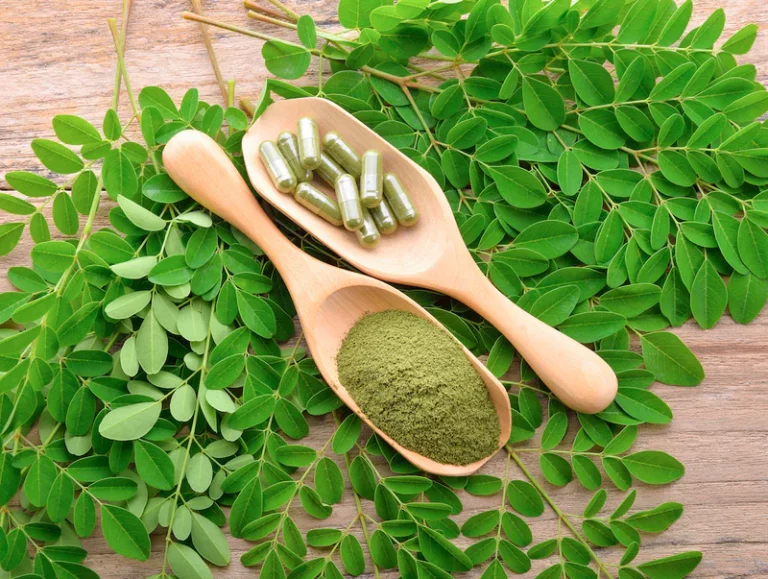


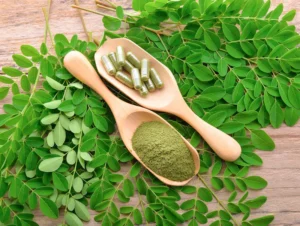
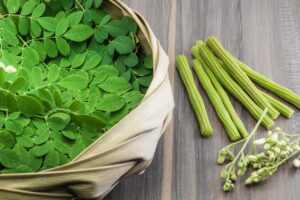





+ There are no comments
Add yours